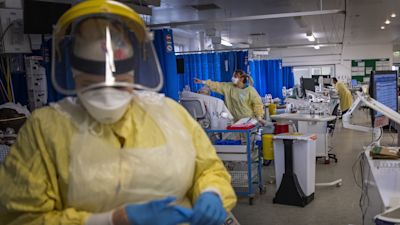Covid: NHS facing ‘the most dangerous situation anyone can remember’, Chief Medical Officer Professor Chris Whitty warns

Video report by ITV News Correspondent Geraint Vincent
The NHS is facing the "most dangerous situation" in living memory as Covid-19 causes record deaths and hospital admission, England's Chief Medical Officer has warned.
The only way to prevent avoidable deaths is for the public to stay at home, Professor Chris Whitty has cautioned.
“Hospitals are always busy in winter, but the NHS in some parts of the country is currently facing the most dangerous situation anyone can remember,” Prof Whitty wrote in the Sunday Times.
“If the virus continues on this trajectory, hospitals will be in real difficulties, and soon.
“Staff-to-patient ratios — already stretched — will become unacceptable even in intensive care.”
The number of patients with Covid-19 in hospital is at a record high in England, while the official coronavirus death toll for the UK passed 80,000 on Saturday and lab-confirmed cases hit more than three million
Covid situation to worsen, doctors warn, as UK hits record infections and deaths
Covid: New public health advert launched urging people to 'stay at home'
Prof Whitty commended the public for their efforts to stop the spread of Covid-19 and noted the hope offered by various vaccines, but he echoed other experts in saying it would be some weeks before the jabs start to reduce the number of people taken to hospital.
Speaking on Sunday, Health Secretary Matt Hancock said "the pressure on the NHS is very, very bad" and that the situation in the health service is "very, very serious... especially in some parts of the country".
In a bid to stop coronavirus cases and deaths from continuing to rise, Mr Hancock told Sky News: "The NHS needs you now more than it's needed anyone at any point and what it needs people to do is to stay at home...
"So it's on all of us really, it always has been a big team effort."
On Saturday, Dr Simon Walsh, deputy chair of the British Medical Association’s consultants committee said the epidemiology from the previous wave indicates the situation is likely to worsen over the next two to three weeks.
While Dr Justin Varney, director of public health at Birmingham City Council, said hospitals had still not seen the full extent of patients who caught coronavirus over Christmas.
Tougher lockdown measures were brought in to try and reduce Covid cases and deaths in a bid to reduce pressure on the NHS, but some some experts have branded the current rules as not strict enough, in the face of the more transmissible variant which has spread rapidly in many parts of the country.
Susan Michie, a professor of health psychology at University College London who participates in Independent Sage, questioned whether restrictions need to be tighter still.
"We have to get to a situation if we're going to get on top of this virus and prevent tens of thousands of avoidable deaths which we are looking at over the next few weeks, we absolutely have to get right back to where we were in March, unfortunately," she told BBC Breakfast.
"Which means that everybody's at home and you don't have many people on the streets.
"But that does need to be accompanied by the government giving good financial support to everybody, including those people in the gig economy and with precarious jobs, not just those on salaries as happened last time."
With the current lockdown and vaccine rollout, deaths from coronavirus are expected to start dropping in February, while hospital admissions should fall after that.
Coronavirus cases are expected to drop in the spring due to vaccinations plus the fact people spend more time outdoors, making it harder for the virus to spread.
Will the government go further with restrictions?
However, more than half of all major hospital trusts in England currently have more Covid-19 patients than at the peak of the first wave.
Hospitals are also seeing far more younger people than during the first wave, scientists said.
In London, mayor Sadiq Khan declared a “major incident” on Friday as the spread of coronavirus threatens to “overwhelm” the capital’s hospitals.
NHS England figures showed the number of Covid patients in London hospitals stands at 7,277, up 32% on the previous week.
One in 30 people in London are now estimated to have coronavirus, compared to one in 50 in England as a whole.
The Office for National Statistics (ONS) estimates that one in 70 people in Wales has Covid, one in 115 in Scotland and one in 200 people in Northern Ireland.
Around eight in 10 recent positive cases of Covid-19 in London and eastern England could be the new variant discovered in the UK, according to the ONS.
The approval of the Moderna vaccine by the Medicines and Healthcare products Regulatory Agency (MHRA) on Friday means the UK should have three vaccines to use when it comes on stream in spring.